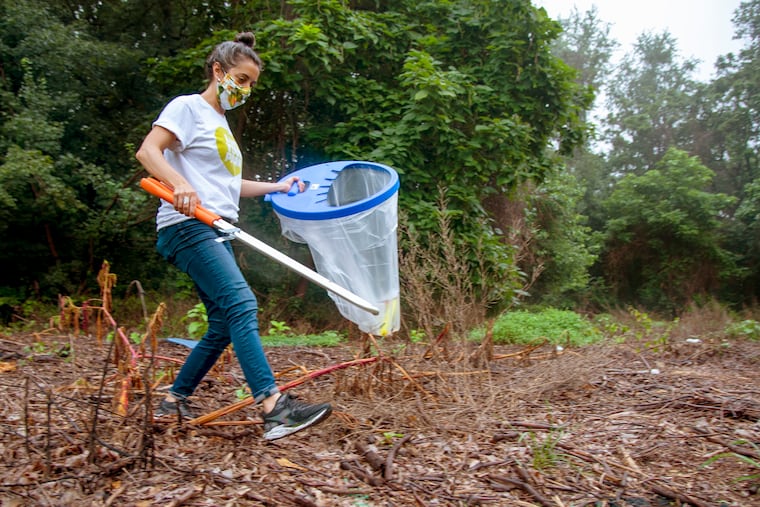When the coronavirus reduced cleanups at Philadelphia parks, volunteers went solo to grab the garbage
Because of the pandemic, more people than ever went to the city’s 200 parks and community gardens for some fresh air. By early April, trash was piling up.

The parks in Philadelphia were getting trashy in mid-March, and the people in charge of keeping them clean were worried.
Stay-at-home restrictions due to the coronavirus pandemic had abruptly ended cleanups by volunteer groups at some parks and led to a reduction in the city’s trash collection. Still, to get outside and clear their heads, more people than ever were visiting the city’s 200 parks and community gardens. By early April, trash was piling up.
So trash-picking volunteers went at it alone. Literally.
“It came from one person asking,” said Julie Slavet, the executive director of Tookany/Tacony-Frankford Watershed Partnership.
That one person asked Slavet for a garbage grabber, the long pole with a hinged claw to pick up trash without having to bend over. For some — and this is key — that device makes trash-picking, well, fun. That person said they would clean the Tacony Creek park, alone, with a mask and plenty of social distance.
The idea caught on, and now, five months later, the Love Your Park Solo Cleanup project is a rousing success.
» READ MORE: Wissahickon park neighbors plan rally to draw help handling large crowds, trash, noise
Since the beginning of April, just a few weeks into the shutdown, dozens of volunteers have received special cleanup kits (yes, with a garbage grabber), and, one-by-one, family-by-family, they are helping to restore the city’s parks back to their trash-free best.
Dalila Bedoya was lucky in that her daughters, Aasya, 11, and Fatima, 8, took to the chore with gusto. Sometimes pushing their scooters, they take turns every few days picking up trash and toting a garbage bag along the Tacony Creek trails.
Bedoya appreciates the company of her family, the lively conversation (mostly from Aasya), and the chance to teach her girls a lesson.
“I see families here, and I know how beautiful it is,” said Bedoya, who has lived near the park for 20 years. “We all want to take advantage of it, and when it’s clean, we feel more secure. A bag can always be a trash can, and [this program] is practical learning instead of me nagging them about it. They don’t like it when I nag.”
The cleanup community that cares for Philly parks is extensive. Partnerships are vibrant among the city’s Parks and Recreation Department, the Fairmount Park Conservancy, and the Park Friends Network of 130 independent nonprofit and volunteer groups that monitor many parks.
There are the usual skirmishes for funding and attention from the city, and disagreements about how some funds are allocated. But the Love Your Park Solo Cleanup project was a slam dunk that started at the bottom of the org chart and quickly zoomed to the top.
“We love thoughtful ideas,” said Elisa Ruse-Esposito, the stewardship manager at the city’s Parks and Recreation Department. “Our park friends met some needs in a new and innovative way, and we were inspired by them.”
» READ MORE: Why some Philadelphia neighborhoods are paying for their own park improvements | Inga Saffron
The Love Your Park program was launched in 2012 as a collaboration of the Parks and Recreation Department and the Fairmount Park Conservancy. It’s a point of pride for everyone involved as nearly 7,000 volunteers engaged in 279 events under the program’s direction in 2019. They planted trees, weeded, spread mulch, and cleared away several tons of trash, program leaders said.
Of course, little of that was possible this year due to the shutdown. So everyone was scrambling for ways to pick up the trash.
“People were reaching out to help but didn’t know what to do,” said Lindsey Walker, the volunteer and environmental program manager at the Fairmount Park Conservancy. “What emerged was a concrete and straightforward strategy."
At first, the effort came from a smattering of volunteers collecting trash as soon as they were allowed in their parks. Philadelphia entered Gov. Wolf’s less-restrictive yellow phase in late May, so local groups, such as Slavet’s Tookany/Tacony-Frankford Watershed Partnership, ramped up supplying free cleanup kits of gloves, bags, maps, bandannas, and, yes, garbage grabbers.
Once Walker and Ruse-Esposito got wind of the idea, they latched onto it, and on June 29 launched the Love Your Park Solo Cleanups. They also offered free cleanup kits worth about $40 to volunteers and invited them to share their work — before and after — on social media.
» READ MORE: Philly’s trash pickup woes are now delaying street repairs as recycling remains significantly behind
The response left Walker “blown away.” More than 300 people responded online in the first week, and 230 cleanup kits were shipped to homes or distributed with social distancing. The 60 high-quality garbage grabbers they offered as incentives were scooped up in the first hour.
The stories, videos, and photos about the cleanups are still lighting up social media threads. More than a few dogs have accompanied their owners on recent cleanups. In addition to the usual assortment of paper, cups, and plastics, one woman reported finding boxer shorts floating in a stream. Another person found a fur coat behind the Art Museum.
Philadelphia went into a modified green phase on July 3, so the cleanup folks hope the solo work gradually returns to a full group activity. Until then, volunteers such as Bedoya at Tacony Creek Park say they will carry on.
“When the park was not clean, we didn’t go in as often,” Bedoya said. “Now, as soon as we walk out, we want to run back in. We want to be the difference.”